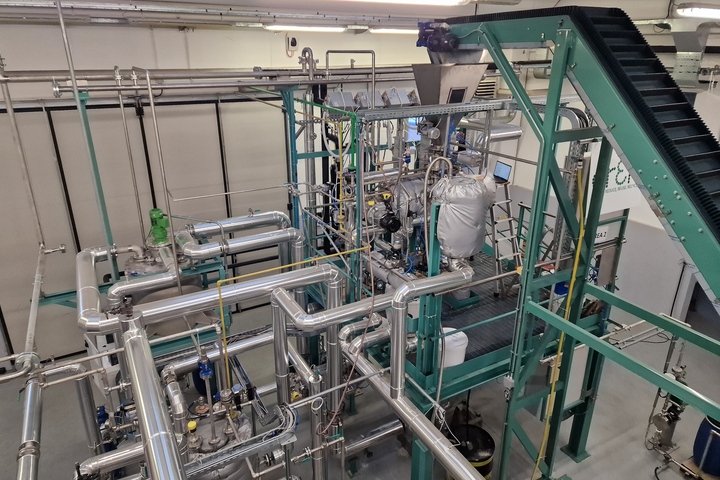GR3N
Swiss tech firm teams up with Schneider Electric to develop system for PET recycling
By Plasteurope.com correspondent
Swiss tech specialist gr3n (Lugano; www.gr3n-recycling.com) has teamed up with Schneider Electric (SE, Rueil-Malmaison, France; www.se.com) to develop what the pair call the first open automation system for the chemical plastics recycling industry, using SE’s EcoStruxure Automation Expert software.
Swiss tech specialist gr3n (Lugano; www.gr3n-recycling.com) has teamed up with Schneider Electric (SE, Rueil-Malmaison, France; www.se.com) to develop what the pair call the first open automation system for the chemical plastics recycling industry, using SE’s EcoStruxure Automation Expert software.
 SE's software-defined automation system would act as the “digital backbone” of operations at gr3n’s new plant (Photo: Schneider Electric) |
Gr3n focuses on chemically recycling PET via its Microwave Assisted Depolymerisation (Made) process, which uses alkaline hydrolysis to break down PET into its chemical building blocks, which can then be recombined to create new PET pellets with virgin-like quality for packaging and textiles.
SE said its software-defined automation system would act as the “digital backbone” of operations at gr3n’s new plant, currently being developed with Spanish engineering service provider Intecsa Industrial (Madrid; www.intecsaindustrial.com), allowing Made to become what it called “the technological demonstration of a new generation of automation systems”.
Related: Scientists develop catalytic recycling process for post-consumer PE, PP
Fabio Silvestri, head of marketing and business development at gr3n, said software automation meant his firm had been able to reconfigure its systems quickly, “when we see opportunities to improve efficiency, while avoiding supply chain issues due the hardware agnostic nature of the system. This is what is needed to make advanced plastic recycling a reality at scale.”
SE said the partnership with gr3n, which started with the signature of a memorandum of understanding, would enable the chemical recycler to scale the latter’s operations to new sites quickly and cost effectively.
Christophe de Maistre, SE’s president of energy, chemicals and industrial automation said if society wanted to overcome the scale of plastics waste, there were certain non-negotiables: “We must see integration across the whole product cycle, modularisation to optimise and standardise engineering processes, as well as software-defined automation solutions that deliver scalability, break siloes and act as a gateway to advanced analytics.”
The project with gr3n “demonstrates all of these principles, improving flexibility, scalability and the efficiency of their solution and enabling them to grow to an industrial scale”, he added.
18.09.2024 Plasteurope.com [256164-0]
Published on 18.09.2024
